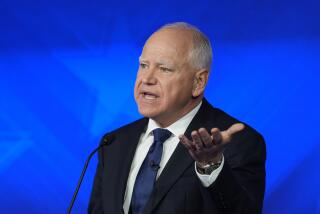Hong Kong Incidents Earn World’s Shrug
- Share via
WASHINGTON — One of the slow, little-noticed changes in U.S. policy toward Asia has been the way Hong Kong has gradually faded from the picture.
On July 1, 1997, when Britain returned its former crown colony of Hong Kong to China, American policymakers, both in the Clinton administration and in Congress, were full of ringing declarations of support for the preservation of Hong Kong’s freedoms.
“The world will be watching closely at everything that happens here,” declared Secretary of State Madeleine Albright in Hong Kong at that time. Hong Kong, she said, is “very high on the list” of issues between America and China.
Sadly, but perhaps inevitably, three years later both of those noble statements seem hopelessly outdated.
Hong Kong No Longer World’s Focus
These days, the list of American priorities in dealing with China includes the World Trade Organization, military and strategic issues, Taiwan, nonproliferation and human rights. Hong Kong is rarely mentioned anymore, except maybe as a formalistic “talking point” at the end of meetings devoted to other subjects.
And the world isn’t watching Hong Kong, certainly not closely.
This year, there have been a series of incidents in Hong Kong that might have provoked an international furor if they had occurred in August 1997. Now, these attract nothing more than shrugs and protestations of helplessness in Washington, London and elsewhere.
Last week, one of Hong Kong’s best-known journalists, Willy Wo-Lap Lam, who for more than 15 years has reported independently and critically about political developments in Beijing, was removed from his job as editor of China news for the English-language South China Morning Post.
The newspaper’s controlling shareholder, Robert Kuok, who enjoys close ties with the Chinese leadership, had objected to a column that Lam wrote last summer.
In it, Lam reported that Chinese leaders had told a group of Hong Kong business executives, including Kuok, to support a second term for Hong Kong’s unpopular Chief Executive Tung Chee-hwa, whom Beijing tapped to run the colony beginning in 1997.
Kuok subsequently complained that the Morning Post’s coverage of China and Hong Kong was overly suspicious of what he called “manifestations of patriotism to the motherland.”
With those words, he appeared to embrace the Chinese leadership’s chilling notion that support for its decisions is “patriotism” and that those who question Beijing’s wisdom are somehow unpatriotic.
Lam was replaced by Wang Xiangwei, a former editor of the People’s Daily, China’s leading propaganda organ. Lam was told that he could stay on with the paper and keep writing, but he said over the weekend he would resign.
This was merely the latest in a recent series of disputes involving Hong Kong’s press coverage of China. Among the others:
* Last spring, a ranking Chinese official admonished representatives of Hong Kong’s news media that they should be selective in how they report news about Taiwan.
In particular, he said, the press should not advocate independence for Taiwan, which China considers part of its own territory--and should not even report the views of people who favor an independent Taiwan.
Hong Kong’s top civil servant, Anson Chan, immediately pointed out that there were guarantees of press freedom for Hong Kong. A few months later, Chinese Vice Premier Qian Qichen issued a public reprimand to Chan.
* Two weeks ago, Chinese President Jiang Zemin suddenly lost his temper when Hong Kong reporters asked him whether he was issuing an “imperial order” for people in Hong Kong to support Tung.
“You media need to raise your general knowledge level, got it?” China’s top leader fumed. “You should not say we have an imperial order and then criticize me. Got it. . . ? I am so angry!”
The common theme in all of these incidents is that the Chinese leadership, long accustomed to press coverage that supports its own policies, is seeking to rein in Hong Kong’s freewheeling journalism.
The misguided optimists about Hong Kong, including some in the U.S. government, would say that all of these incidents are a good sign because they show that Hong Kong’s press hasn’t been fettered yet: It’s still lively enough to irritate Beijing.
But these Panglosses ignore the darker truth: that the situation is gradually changing. The Hong Kong press is being warned in many ways that some specific subjects (such as Taiwan independence) are out of bounds and that in general its coverage should be more “patriotic.”
Danger Is in Subtle Erosion of Liberties How we judge Chinese rule in Hong Kong depends on the criteria we apply. The optimists say that, because China hasn’t marched People’s Liberation Army troops onto every street corner, things seem to be OK.
But that’s an unrealistic standard. China was never going to do anything so stupid. From the beginning, the real danger to Hong Kong lay not in any single overwhelming Chinese act of repression but in a more subtle, gradual erosion of its liberties and free institutions.
China’s guarantees to preserve Hong Kong’s freedoms were said to be good for 50 years after 1997. But Beijing could count on the fact that the rest of the world would quickly lose interest. Unfortunately, that’s what we’re seeing now.
More to Read
Sign up for Essential California
The most important California stories and recommendations in your inbox every morning.
You may occasionally receive promotional content from the Los Angeles Times.













